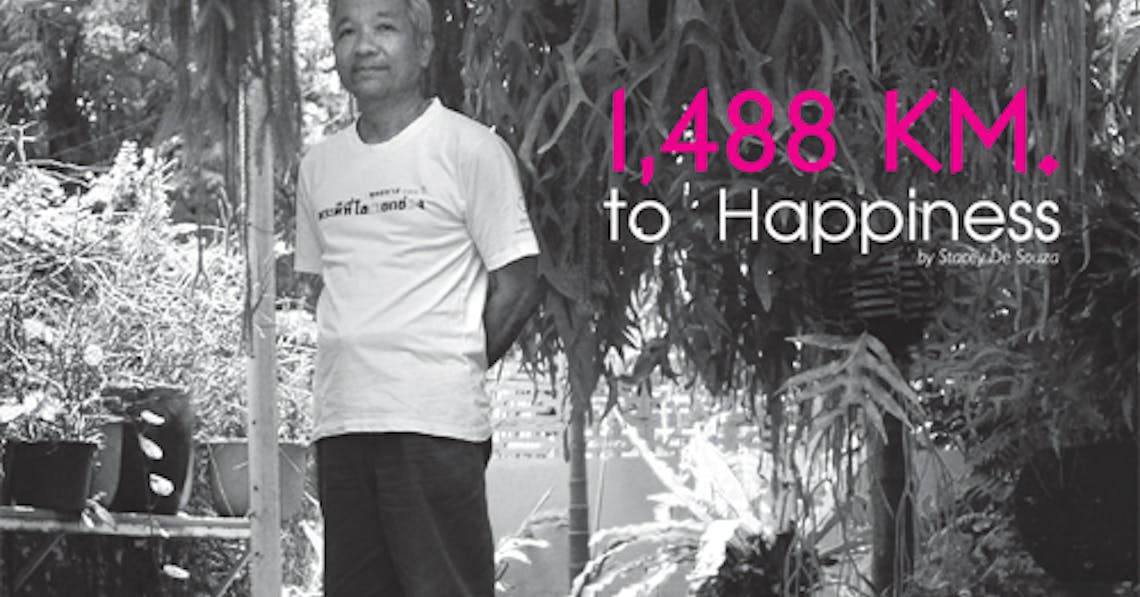The distance from Chiang Mai to Koh Samui is 1,488 kilometres, which is approximately 870 miles for those less metrically inclined, but no matter what scale you use, the walk from Chiang Mai in Northern Thailand to Koh Samui in the South, is a long one. For Ajarn Pramuan Pengchan however, those 1,488 kilometres were an opportunity not only to walk to his home island, but also to walk to freedom (as he would later title his bestselling novel). With nothing but a change of clothes, a packed lunch and praying beads provided by his wife, a bottle of water, postcards to occasionally mail home, a hat and a diary, he set off on October 23rd 2008 at the age of 50, on a journey that would take him 66 days to complete. It would be one that would change his life forever.
When the Citylife crew arrived at his modest home, Ajarn Pramuan was patiently waiting by his front gate, with a smile on his face that could only be described as peaceful. Graciously, he welcomed us into his home, offered us food and water, and began an inspirational conversation.
Naturally, my first question for him was what motivated him to take on such an arduous task.
“Being in the government bureaucracy, as a lecturer, you spend the latter part of your life imparting knowledge rather than gaining it. I wanted to make myself happy and I wanted to gain knowledge,” he responded.
In order to embark on this journey, Ajarn Pramuan retired from his influential position at Chiang Mai University, where he was a well-respected and admired philosophy professor. It seems theoretical philosophy, however, didn’t have all the answers that Ajarn Pramuan was looking for. The best education, he believed, would come from the difficulties he would face on his trip, which he saw as an opportunity for self improvement.
“I wanted to be able to encounter difficulty with a heart that was filled with happiness, with a positive attitude and with joy,” he explained in a tone that signified a goal accomplished.
The ajarn left his wife, his job, his friends and his responsibilities behind when he departed. He committed himself to being nothing but a solo wanderer of the land. He never told his story unless he was asked, and he never expected the kindness he received.
Wisdom radiated as he shared the tools he used to survive those 66 days. “I had a few principles I stuck with on this journey; one principle was that I wouldn’t beg, and another was that I would always tell the truth. I also constantly said to myself, ‘I will not be unhappy and I will not be afraid’.”

Unsure of where his next meal would come from or where he would sleep that night, Ajarn Pramuan lived each day with only the strength in his heart and determination in his mind. He wanted simply to rid himself of the fear, anger and regret that he had accumulated in his lifetime, and he wanted to discover where those feelings came from. With the help of Buddhist philosophies and techniques, he soon realised that he had generated those feelings himself.
With the look of a recently enlightened man, he said, “When I didn’t get to eat for a few days, and I was getting to the point where I was feeling light headed and had to lie down, fear of death started coming, fear of the end of life. You start to think of what you’re going to lose. So what I had to do was realise that I had lived an amazing life, I was happy where I was and it didn’t matter.”
With 108 beads in hand, Ajarn prayed himself through any difficulty that arose. Whether in a field, or in the forest, he would simply sit cross legged and ask for forgiveness from mother earth. The kindness of strangers, he admitted, was overwhelming and the stories he shared were inspiring. As strange as many people thought he was, and as afraid as they were to see this lonesome man wandering through their villages, more often than not they offered him water, food and a place to stay.
When asked who the most interesting person he met along the way was, Ajarn found it almost impossible to give just one answer. He did however recall a man he met while seeking shelter in a temple one night. By modern social standards, this man was mentally deficient and could barely differentiate between a 20 and 50 baht note. He made the ajarn pray to a statue of a giant in the temple before he permitted him to sleep there, then asked a monk for a handful of rice so that that he could cook it and feed him.
“All my life I’ve been with intellectuals, not with people who are intellectually challenged, and yet one of the most touching moments of my life was the kindness that came from this person who was completely intellectually challenged.”
From handicapped beggars to likae heroes, Ajarn Pramuan met every variety of people there was to meet, all of whom he said, changed his life in some way. He also noted that, if it weren’t for this journey, most of these encounters may never have come to pass. For a man who seems fearless, I was curious if there was anything that could daunt him.
“In the old days when I used to have a job, I worried about my security and everything, now there’s none of those worries left. While the world around hasn’t changed or evolved, what I’ve found inside is that peace now that I can accept the world as it is and accept myself. There’s no fear once you release it.”
As if he were telling a folk tale or perhaps even a joke, Ajarn Pramuan relayed a story about the night he slept in a cave that was said to be the home of a cursed snake. Just the week before, a monk was said to have committed suicide in the cave. Villagers warned him not to venture near it, but Ajarn Pramuan shrugged off their warnings and assured them that he would pray for both the deceased monk and the snake. Aware of all the dangers that possibly awaited him, the ajarn proceeded to the cave, where he would spend a restful night waking up to a view of the mountains and without plague from any cursed snakes. The serenity in his smile as he told his story was proof that he had in fact conquered that thing called fear.
On the 66th day of his journey, after countless nights sleeping in temples or alongside stray dogs and beggars in the streets, Ajarn Pramuan Pengchan arrived in Koh Samui with tear filled eyes. He was finally home.
His worried aunt immediately sent him a return bus ticket to Chiang Mai, where his wife patiently awaited him. His marriage, he says, is stronger today than it ever has been.
“Men often use thought and logic to structure how they react to things, and once I let go of that and used my heart more than my logic and my mind, I really realised that in the past I was wrong. Whereas I used to resent my wife for asking me to do things for her, I now find joy in making her happy. I’m so much happier now because I just do what my heart wants without using my thoughts to analyse what my wife wants or why she is the way she is; I just love her.”
Today, Ajarn Pramuan is happily living in Chiang Mai with no future plans of a similar journey, although he does occasionally venture into the wilds to write in the quiet company of nature. Part of his revelation, he disclosed, was that he has no more desires or needs, instead he has reached a point in his life where seeing other people happy is what brings him joy. Although he did secretly let slip that if he could do anything before he dies, it would be to return to his home island of Koh Samui and walk around the island three times to thank the earth for granting him such a blessed life.
The number of lives he has touched remains uncounted, but Ajarn has stayed in touch with many of the kind strangers turned friends that he met along the way. A few years after his book was published, Ajarn Pramuan was contacted by a university professor who had found a man that was mentioned in his novel and who he was desperately seeking to find. This man was a roving troop hero who had asked to join the solo wanderer on his journey. Convincing his new friend that his likae troop needed their hero, Ajarn Pramuan continued on alone. Curious as to what had become of his ambitious friend, he requested that his readers contact him if they ever found the mysterious hero. Sadly, when he was finally located, a terrible car accident had left him in the hospital with brain damage and barely able to communicate. To be certain that this was the man mentioned in Ajarn Pramuan’s novel, the university professor read the book aloud to him, and when he arrived at the part where the trooper was mentioned, the bed ridden hero burst into tears. Soon after being contacted, Ajarn Pramuan rushed to his old friend’s bedside where they sat and cried together, enveloped in a connection that only the two of them would ever be able to understand.
After multiple stories, life lessons and inspiration to last a lifetime, I mustered up one last question for Ajarn as I unwillingly walked through his gate to leave. I asked whether he ever got lonely…and with an all-knowing smile he turned to me and said, “Never.”
